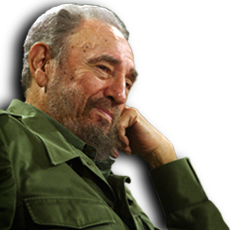VILMA’S STRUGGLES
Vilma is dead. Even though the news was expected, it was still an impact. Out of respect for her delicate health condition, I never raised her name in my reflections.
Vilma’s example today is more necessary than ever. She devoted her entire life to the struggle for women’s rights when in Cuba most women were discriminated against as human beings, the same as in the rest of the world, with only the honorable revolutionary exceptions.
It was not always this way throughout the historical evolution of our species, leading her to fulfill the social role befitting her as a natural workshop where life is forged.
In our country, women came out from under one of the most horrible forms of society, that of a Yankee neo-colony under the aegis of imperialism and its system, where everything that the human being is capable of creating was turned into merchandise.
When what has been defined as the exploitation of man by man started far back in history, the mothers and children of the dispossessed bore the brunt of the burden.
Cuban women used to work as domestic servants, or in luxurious shops and bourgeois bars, selected for their good looks. Factories assigned them the simplest jobs, the ones that were the most repetitive and worst paid.
In education and healthcare --services provided on a small scale-- their indispensable cooperation was as teachers and nurses who had only been offered basic training. The country, 2,009.92 miles from end to end, only had one higher education center located in the capital and later, several faculties in university campuses in two other provinces. As a rule, the only young women who could study there were those from the most affluent families. In many activities, the presence of a woman was not even dreamed of.
For almost half a century, I have been witness to Vilma’s struggles. I cannot forget her presence at the meetings of the July 26 Movement in the Sierra Maestra. She was eventually sent by the movement's directorate to carry out an important mission on the Second Eastern Front. Vilma did not shrink from any danger.
After the triumph of the Revolution, she began her ceaseless battle for the rights of Cuban women and children, which led her to found and lead the Federation of Cuban Women. There was no national or international forum too distant for her to attend in defense of her assailed homeland and of the noble and just ideas of the Revolution.
Her gentle voice, steady and timely, was always listened to with great respect in Party, State and mass organization meetings.
Today women in Cuba make up 66 percent of the technical work force of the country, and they take part, in the main, in almost all the university degree courses. Previously, there were hardly any women involved in scientific activities, since science and scientists did not exist, but exceptionally. In this field as well, today women are in the majority.
Revolutionary duties and her immense work load never prevented Vilma from fulfilling her responsibilities as a loyal wife and mother of several children.
Vilma is dead. Long live Vilma!
Fidel Castro Ruz
June 20, 2007.
2:10 p.m.



